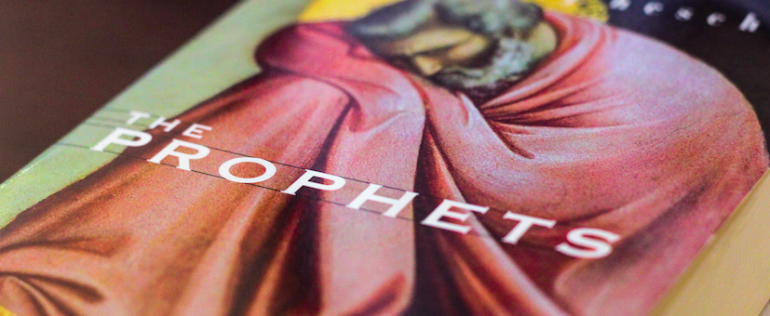I recently began a re-reading of Abraham Heschel’s classic work, The Prophets, as part of personal research on the idea of “the weakness of God”. I first read Heschel as part of a undergrad class on the prophets of the Hebrew scriptures. The class was very small, consisting of only four or five of us. Through reading Heschel’s work and our personal, in-depth, and lengthy discussions, I was captivated and forever changed by the image of the prophet as one who wrestles with the “divine pathos”, the very suffering of God.
Something about this prophetic identity resonated with me, not only in terms of the prophets’ voiced experiences but also in terms of the God of Abraham, Isaac, and Jacob being something other than the removed, philosophically described deity found in so much of our doctrine and popular concept. The God of the prophets was engaged, emotional, more “human” than we would like, volatile and unpredictable in mood but consistently predictable in love. From the traditional philosophical points of view, such a God is moved by passions and therefore weaker than a stoic, unchanging, “unmoved Mover”.
But this emotional God, weak in the philosopher’s eyes, is the God of Abraham, Isaac, and Jacob of the scriptures; and Abraham Heschel brought this to bear in his treatment of the Prophets. For Heschel the God of the prophets is “the most moved mover,” more deeply affected by human existence and experience than we can fathom. The prophet personally carries a sense of this divine pathos not just in word but in experience.
In the introduction to the latest version of The Prophets, Heschel’s daughter Susannah captures this well:
“Hence the prophet is neither a messenger, an oracle, a seer, nor an ecstatic, but a witness to the divine pathos [suffering], one who bears testimony to God’s concern for human beings. My father emphasized that God is not simply a topic of human interest, but that we are objects of divine concern. Being gripped by the anguish experienced by God in response to human affliction leaves the prophet overwhelmed and tormented. Facing callousness and indifference, the prophet does not perceive God as a source of comfort and reassurance, but as an incessant demand: ‘While the world is at ease and asleep, the prophet feels the blast from heaven.‘”
—Susannah Heschel
emphasis added
